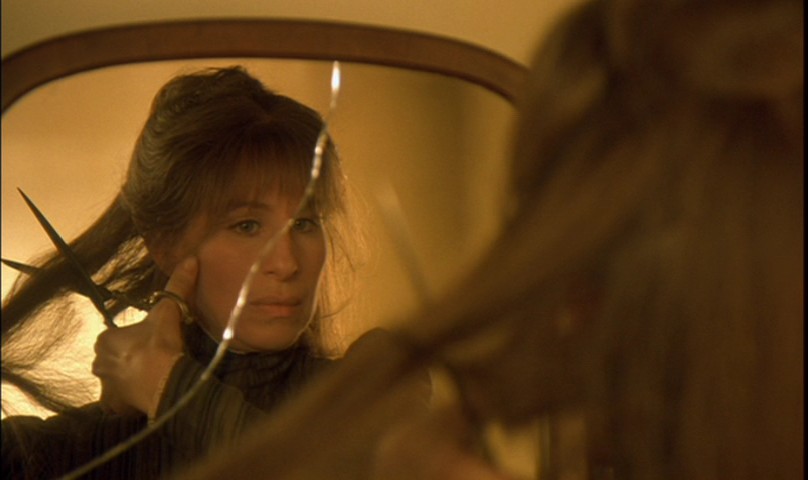On Sunday nights, we gather all the piles of clean laundry into the living room and fold it while watching a movie. The kids were not amused by my choice last Sunday: “Yentl” (now stream-able on Netflix!). They don’t like to watch “old” movies and they turned up their noses when they realized it was a musical. (For what it’s worth, they must’ve gotten their distaste for musicals from their dad, because I’m a sucker for a good musical and will say-without a bit of exaggeration or hyperbole-that some of my most spiritual experiences have been while watching musicals.)
I haven’t seen Yentl for probably 15 (20?) years, but its theme has stuck with me-the notion of being trapped in a culture or a set of circumstances that you simply cannot abide. Of course, Yentl’s situation is extreme-she is a strong, outspoken Jewish woman in Eastern Europe in 1904. She longs to study philosophy and religion, but her culture will not allow it. She is frustrated by simple answers to her complicated questions and asks “Why?” and “Where is it written?” when people offer unsatisfactory explanations for the prohibitions she faces. She does not want to cook fish and almond cookies and wait on her husband hand and foot. In fact, she is not interested in a husband in the least.
In case you haven’t seen it, Yentl’s rabbi father dies early in the movie and she does the unthinkable-she cuts her hair and moves to another city and pretends to be a man-a yeshiva boy. Her first night as a man, she lights a candle and says a prayer and asks her father for forgiveness and understanding-and permission, in a way, to do this unthinkable thing.
Papa, please forgive me.
Try to understand me;
Papa, don’t you know I had no choice?
Can you hear me praying,
Anything I’m saying
Even though the night is filled with voices?
I remember everything you taught me
Every book I’ve ever read…
Can all the words in all the books
Help me to face what lies ahead?
The trees are so much taller
And I feel so much smaller;
The moon is twice as lonely
And the stars are half as bright…
Papa, how I love you…
Papa, how I need you.
Papa, how I miss you
Kissing me good night…
Yentl gains entrance to a university and hits her stride. She also falls in love with a man, which complicates her life for obvious reasons. I won’t spoil the ending in case you haven’t seen it, but by the end of the movie, I was sobbing. My girls (ages 14 and 11) were perplexed. One asked, “Mom, I know you like musicals, but . . . seriously?” They ran off to brush their teeth while I composed myself. After the usual bedtime prayer, I tried to explain, but could barely get the words out.
I tried to explain to them that I never want them to feel trapped by my expectations and hopes for them. I don’t want them to live their lives in fear that I will feel saddened and disappointed by their decisions. I joked that I’d rather they not turn their lives into an episode of Girls Gone Wild, but I want them to figure out who they need to be, to figure out what rules they can abide and what expectations they can fulfill and let the others go. I want them to figure out what path will make them happy and get on it-even if that leads them away (ideologically) from me.
I was touched at the end-after Yentl has made some heart-wrenching decisions-that her mind goes back to her father. But this time, she is not worried about disappointing him or asking for his permission or forgiveness. This time, she trusts that he is watching her from somewhere and asks him just to watch her fly (see minute 3:15). I was reminded of the power we exert as parents. I pray my children do not ever feel that I wield my expectations for them as a weapon. I hope they know that I’m ready to watch them fly.


I feel the same way about my position as a parent, and although I don’t remember a lot about this film, I do remember that it resonated with me. I’ll have to watch it again.
Helen, watch it again. Watching it was very different to me as a parent (and as an adult) than it was when I first saw it as a child.
Heather, thanks for reminding of this film. I watched this movie while attending BYU on a double date in the mid 80s. We all enjoyed it, the movie being a pleasant surprise to me given my less than enthusiastic personal assessment of Streisand’s singing talents. My friend Pledge (a southern male name) especially enjoyed it, marvelling that the movie had so much insight into “the secret yearnings of the human soul.” I remember him saying something like this and assuming, along with our dates, that he was referring to the troubles of a woman trying to break societal gender roles. My friend later gathered the courage to tell me he was gay, the first person I had ever known who had openly embraced such an identity. Looking back, no doubt, what really resonated for him and was the reality behind his statement was the troubled attraction felt by Avigdor for Yentl as she assumed the role of Anshel the Yeshiva boy. My friend died of AIDs several years later.
Wow, Ed. That is a tough story.
There is SO much going on in this movie–so much that I missed when I first saw it.
Heather, I love this movie too, and I typically don’t like musicals. (My wife, who does, can use this as ammunition when trying to get me to watch a musical: “Well, you liked Yentl, didn’t you?”)